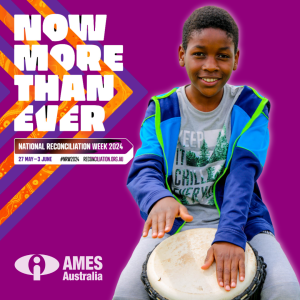Refugees flourishing in the regions – study
Refugees who have settled in regional Australia feel welcome and safe, and value the peaceful environment regional communities provide in raising children, according to a new study.
The study also found refugees were finding employment opportunities and affordable housing in the regions.
It found refugees valued the lack of congestion in regional Australia and they most planned to stay.
The study said refugees mostly felt welcomed by indigenous communities and that it was important to learn about indigenous culture.
But it also identified issues with a lack of service provision and educational opportunities.
 The findings are the interim results from ‘Settling Well’, a five-year longitudinal comparative assessment of the impacts of refugee settlement in regional Australia.
The findings are the interim results from ‘Settling Well’, a five-year longitudinal comparative assessment of the impacts of refugee settlement in regional Australia.
The study surveyed refugee and established communities in Nhilll, Mildura, Albury-Wodonga, Cowra-Orange, Rockhampton and Townsville.
It asked refugees how they felt about life in rural Australia in terms of economic, cultural and social outcomes as well as access to opportunity and health and wellbeing.
The research was conducted by a team led by Professor Natascha Klocker, from the University of Wollongong and, so far, has surveyed 324 people from 25 countries. Most of the participants were from the Democratic republic of Congo, Burma, the Central African Republic, Afghanistan and Bhutan.
“Overall, people feel safe and peaceful in regional Australia. They felt welcomed by, but also a little isolated from, communities mostly because of language barriers,” the researchers said.
“They like the lack of congestion, and they see regional communities as better places to raise kids because they see them as safer from bad influences. But this also comes with less educational opportunities.
“Many people have been able to buy houses, that would have been out of reach in the cities. And employment opportunities are generally good,” the researchers said.
Asked if they planned to stay in regional Australia, 75 per cent said they planned to stay long term and just 5 per cent said they did not.
Almost half (43 per cent) said they felt welcomed by indigenous communities and that it was important to be welcoming to indigenous Australians, while just 13 per cent said it was not important.
The study found refugees were mostly satisfied with the support they received on settling into new communities.
“We found that individuals – settlement workers, volunteers and community members – were important in helping people to settle,” the researchers said.
The study also found services in the regions were less accessible than that in cities.
“In some communities we found a lack of things like dental services, refugee mental health and immigration lawyers,” the researchers said.
“We also found that younger adults were missing out on schooling and further educational opportunities.”
The study also identified a lack of English language tuition in secondary settlement locations, where mainstream settlement services are not available.
The study’s preliminary recommendations included: flexible settlement core funding to respond to needs that arise; reassessment of needs after initial settlement, and flexible delivery of English language classes tailored to different aspirations and locations.












